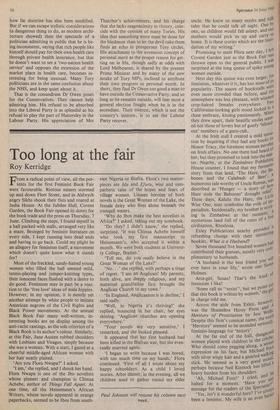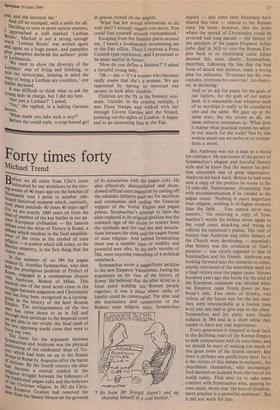Too long at the fair
Roy Kerridge
From a radical point of view, all the por- tents for the first Feminist Book Fair were favourable. Riotous miners stormed up and down Fleet Street, and in Aldwych angry Sikhs shook their fists and roared at India House. At the Jubilee Hall, Covent Garden, the Book Fair opened its doors for the book trade and the press on Thursday, 7 June. Climbing the steps, I found myself in a hall packed with stalls, arranged very like a maze. Besieged by feminist literature on every side, I kept running into dead ends and having to go back. Could my plight be an allegory for feminism itself, a movement which doesn't quite know what it stands for?
Most of the freckled, sandy-haired young women who filled the hall seemed mild, tennis-playing and jumper-knitting types, their innocent faces flushed with a desire to do good. Feminism may in part be a reac- tion to the 'free love' ideas of male hippies. However, in my opinion, it is mostly yet another attempt by white people to imitate American negroes of the Civil Rights and Black Power movements. At the annual Black Book Fair many well-written, in- teresting books are on display among the anti-racist rantings, as the sole criterion of a Black Book is its author's colour. Similarly, at this Fair, Jane Austen rubbed shoulders with Lesbians and Viragos, simply because she was a woman. With a start, I gazed at a cheerful middle-aged African woman with her hair neatly plaited.
`Are you Flora Nwapa?' I asked.
`I am,' she replied, and I shook her hand. Flora Nwapa is one of the Ibo novelists whose pioneer and champion is Chinua Achebe, author of Things Fall Apart. At one time, all the Heinemann's African Writers, whose novels appeared in orange paperbacks, seemed to be Ibos from south- east Nigeria or Biafra. Flora's two master- pieces are Idu and Efuru, wise and sym- pathetic tales of the hopes and fears of village women. Unseen heroine of both novels is the Great Woman of the Lake, the female deity who lives alone beneath the tranquil waters.
`Why do Ibos make the best novelists in Africa?' I asked, taking out my notebook.
`Do they? I didn't know,' she replied, surprised. 'It was Chinua Achebe himself who took my first manuscript to Heinemann's, who accepted it within a month. We were both students at Universi- ty College, Ibadan.'
`Tell me, do you really believe in the Great Woman of the Lake?'
`No... ' she replied, with perhaps a tinge of regret. 'I am an Anglican! My parents, both alive, are deeply religious, and my maternal grandfather first brought the Anglican Church to my town.'
`In England, Anglicanism is in decline,' I said sadly.
`Well, in Nigeria it's thriving!' she replied, bouncing in her chair, her eyes shining. 'Anglican churches are opening everywhere.'
`Your novels are very sensitive,' I remarked, and she looked pleased.
It appeared that her first husband had been killed in the Biafran war, but she even- tually married again.
'I began to write because I was bored, with too much time on my hands,' Flora continued. 'First of all I wrote about my happy schooldays. As a child I loved stories. After dinner, in the evening, all we children used to gather round my elder
Spectator 16 June 1984 uncle. He knew so many myths and folk tales that he could talk all night. One by one, us children would fall asleep, and our mothers would pick us up and carry us home. It is these stories which are the foun- dation of my writing.'
Promising to meet Flora next day, I left Covent Garden just as the Book Fair was thrown open to the general public. I was surprised at the long queue of spiky young women outside.
Next day this queue was even larger, for feminism, whatever it is, has lost none of its popularity. The mazes of bookstalls were even more crowded than before, and the atmosphere was less pleasant, with wizened crop-haired females everywhere. Tw° Californian-looking girls stood locked in 3 close embrace, kissing passionately'. When they drew apart, their beatific smiles seem' ed not those of lovers but of goofy 'blisseu" out' members of a guru-cult. At the Irish stall I created a mild sens1 tion by inquiring if they had any books Honor Tracy, the foremost woman novelist, on Irish affairs. No one there had heard 01 her, but they promised to look into the Mat- ter. Nearby, at the Zimbabwe Publishing House counter, I found that my favourite story from that land, 'The Hare, the Oa' boons and the Calabash of Beer', a humorous tale worthy of Uncle Remus, was described as 'Hunger — a story of h°" Hare stole the Baboons' drought relief'. These days, Kalulu the Hare, the Little Wise One, may symbolise the evils of it1,: perialism. Incidentally, my brother is wow in g in Zimbabwe at the moment, at mysterious land full of the ruins of a lost civilisation, Rhodesia. Exley Publications nearby provided. „, a refreshing change with their interest booklet, What is a Husband? Seven thousand five hundred women had very COra
plimentary to husbands. contributed their guesses, mostly
`A husband is the best friend You vv' !il ever have in your life,' wrote one Sus"- Holmes. Some call us "sexist", but we point Outi ,likSetran! That's the kind of remAitntal is-mgi that this book is written by women,' the gir in charge told me. Across the aisle from Exley, however was the Shameless Hussy Press and ils, Herstory of Prostitution by Jess We'rd Despite this firm's comical name, the we! ` f He me ri ns tios tyi a' nsge euma geed ftoor be iintended seriously ed At the far end of the hall, dungafe,, women played with children in the creel; Who should come pegging along, a se,reot expression on his face, but Michael r°,0g with silver wispy hair and a gnarledwalkld, stick. He seemed in a very good moo a , perhaps because Neil Kinnock has lifted
heavy burden from his shoulders. he
`Ah, Michael Foot!' I cried, and „y halted for a moment. 'Have you 11,;", message for the readers of the Spectatora,. 'Ys, isn't it wonderful here? I've alwuerl5 beene a feminist. My e wife is an even be One, and she instructs me.'
And off he stumped, with a smile for all. Deciding to turn to more serious matters, I approached a stall marked 'Lesbian Books'. Marked is not a strong enough word. 'Lesbian Books' was written again and again on a huge poster, and pamphlet after pamphlet declared the authors' pride in Lesbianism.
`We want to show the diversity of the Lesbians' way of living and thinking, to ruin the stereotypes, keeping in mind the ways of being a Lesbian are countless,' one leaflet declared.
It was difficult to think what to ask the "ling lady in charge, but I did my best. Are you a Lesbian?' I asked. ,
Yes,' she replied, in a halting German accent.
`What made you take such a step?' Before she could reply, a crop-haired girl
in glasses turned on me angrily.
`What has her sexual orientation to do with this? I strongly suggest you move. You could find yourself severely outnumbered.'
Escaping from the feminist glares around me, I heard a loudspeaker summoning me to the Fair office. There I received a Press Council-type reprimand, and I promised to be more tactful in future.
`How do you define a feminist?' I asked a forceful young lady.
`Oh — urn — it's a woman who becomes really aware that she's a woman. We are oppressed by having to interrupt our careers to look after children.'
Children are the fly in the feminist oint- ment. Outside, in the evening sunlight, I met Flora Nwapa and walked with her through Covent Garden and the Strand, pointing out the sights of London. A happy end to an interesting Day at the Fair.













































 Previous page
Previous page